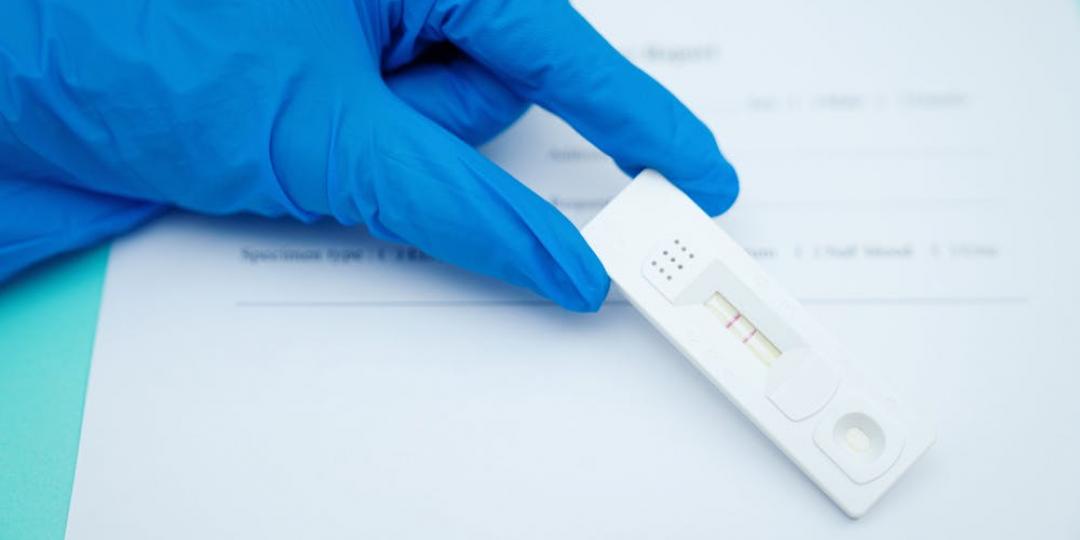The Department of Health has, with immediate effect, rolled out antigen tests for SARS-CoV-2 at all ports of entry in South Africa with immediate effect.
Media liaison for the Department, Dr Lwazi Manzi, pointed out that while this did not replace the required certified negative SARS-CoV-2 PCR test result (not older than 72 hours), this test could be applied to all travellers arriving in South Africa without the SARS-CoV-2 PCR test certificate.
She explained that antigen tests – which differed from different from antibody tests – detect the presence of a specific viral antigen, which implies current viral infection. “The advantage of the antigen test is that, unlike the PCR test, the results are available in 15 minutes,” said Manzi.
A press statement from government said the decision had been taken “in consideration of the logistical complications” that a point-of-entry PCR test posed. “Government is also aware that some of our neighbouring countries, for example Lesotho, do not have the capacity to conduct PCR testing for all travellers destined for South Africa. Antigen testing will therefore enable the management of the influx of travellers without certified PCR tests,” said a departmental spokesperson.
The World Health Organization has recently approved the use of rapid antigen tests as a point-of-care diagnostic for COVID-19 for a screening and surveillance tool in the community where a rapid result is required at low cost.
Professor Eftyhia Vardas, Head of Virology at Lancet Laboratories, told Tourism Update that many labs around the world were also working on SARS-CoV-2 antigen tests. These are conducted on upper respiratory tract samples and also detect fragments of the SARS-CoV-2 virus itself.
“These tests are very similar in concept to COVID PCR tests but use different technology to PCR. Antigen tests are very attractive because their turnaround times are 15 to 30 mins and can be done at the point of contact with the patient, for example at the airport,” she explained.
Antigen tests have been approved by the US FDA and other regulatory authorities around the world.
How it works
The South African Health Products Regulatory Authority (SAHPRA) has granted emergency use authorisation for two companies to supply antigen tests. It is anticipated that more of these tests will become available from other suppliers.
The National Health Laboratory Service (NHLS) will procure these tests initially for use at SA’s ports of entry. In time, as more kits become available, these tests will be rolled out in community surveillance programmes.
The antigen test is conducted by collecting a sample from the naso-oropharyngeal area, in the same way as a PCR test, and therefore sample collection must be done by a professional and cannot be done by an individual at home.
“It is important to be aware that the PCR test remains the gold standard, given that it has much higher sensitivity and specificity than the rapid antigen test,” said Manzi.
All travellers are urged to adhere to the regulations and ensure that, where possible, they complete processing their PCR tests not more than 72 hours prior to their departure or arrival at a port of entry in South Africa.
However, in the event of a traveller arriving at a port of entry without a certified negative PCR test, the procedure is as follows:
- The traveller will be screened for signs and symptoms on arrival.
- Upon failure to produce a certified PCR test result, the traveller will be directed to a testing facility at the port of entry.
- A staff member from NHLS will collect the samples and conduct the test immediately.
- The cost will be borne by the traveller and the NHLS will be remunerated upon testing. Travelers must be prepared to pay out of pocket (approximately R150 to R170 – or around €7 to €8) and claim the fees from their health insurance service provider (pending the relevant insurance agreement).
- If the traveller tests negative, they will be allowed to proceed through the port of entry, provided they have been cleared of red flags at the screening phase.
- If the traveller tests positive he/she will be required to quarantine at a facility designated by that particular port of entry. They will not be permitted to travel across provinces. Contacts of a traveller testing positive at the point of entry, including those who were in the proximity of the traveller within the conveyance, will also be tracked and traced.
- Travellers who arrive without a certified PCR test and who refuse to test at the port of entry will not be permitted entry into the Republic and must quarantine at a designated facility.






